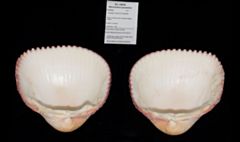Project 5353: J. Schneider. 1998. Phylogeny of the Cardiidae (Bivalvia): Phylogenetic relationships and morphological evolution within the subfamilies Clinocardiinae, Lymnocardiinae, Fraginae and Tridacninae. Malacologia. 40:321-373.
Abstract
The cardiid bivalve taxa Plagiocardium, Maoricardium, Clinocardiinae, Fraginae, Goethemia, Lymnocardiinae, and Tridacninae form a monophyletic group. The most parsimonious cladograms of this group have a topology of (Plagiocardium (Maoricardium (Clinocardiinae (Fraginae (Goethemia (Lymnocardiinae, Tridacninae)))))). The giant clams form a subfamily (Tridacninae) of Cardiidae. In the ontogeny and phylogeny of giant clams, the morphology and position of the muscle scars and hinge changes from that resembling the dimyarian Cerastoderma to the monomyarian morphology displayed by Hippopus and Tridacna, which have lost the anterior half of the shell. This peramorphic trend is the result of differential growth: tremendous growth rate of the posterior portion of the shell and a zero or even negative growth rate of the anterior half of the shell. All tridacnines and several species of fragines are known to harbor photosymbiotic zooxanthellae. These algae transfer excess carbon to its cardiid host. It is known that the chemosymbiotic lucinid and solemyid bivalves reduce or lose many features of their digestive systems. The sulfur-reducing bacteria in lucinids and solemyids provide most of the nutrients that the host clam needs, thus making a full digestive system unnecessary. Most fragine cardiids reduce numerous structures of their digestive systems. Only a few fragines have been examined for the presence of photosymbionts. Based upon their anatomy, it is predicted that most or all of the derived fragines harbor photosymbionts. Tridacnines harbor photosymbionts but do not appreciably reduce their digestive systems. The possession of both photosymbionts and a fully functional digestive system allows tridacnines to be the fastest growing and largest of the extant bivalves.Read the article »
Project DOI: 10.7934/P5353, http://dx.doi.org/10.7934/P5353
| This project contains | Matrices |
|---|---|
Download Project SDD File | Total scored cells: 1457 Total media associated with cells: 0 Total labels associated with cell media: 0 |
| Characters | |
| Total characters: 51 Total characters with associated media: 0 Total characters with media with labels: 0 Total character states: 155 Total character states with associated media: 0 Total character states with media with labels:0 Total unordered/ordered characters:51/0 |
Currently Viewing:
MorphoBank Project 5353
MorphoBank Project 5353
- Creation Date:
08 July 2024 - Publication Date:
17 September 2024
This research
supported by
Authors' Institutions ![]()
- University of Michigan
Members
| member name | taxa |
specimens |
media | chars | character
| cell scorings (scored, NPA, "-") | cell
| rules | ||||||
| Shreya Jariwala Project Administrator | 34 | 2 | 6 | 51 | 0 | 0 | 1457 (1457, 0, 0) | 0 | 0 | 0 | ||||
Taxonomic Overview for Matrix 'M29953' (34 Taxa)
| taxon | unscored cells |
scored cells |
no cell support |
NPA cells |
"-" cells | cell images | labels on cell images |
member access |
| [1] † Plagiocardium Taxon name last Modified on 07/08/24 | 28 | 25 | 23 | 0 | 0 | 0 | 0 | 1 |
| [2] † Maoricardium Taxon name last Modified on 07/08/24 | 1 | 50 | 50 | 0 | 0 | 0 | 0 | 1 |
| [3] † Ciliatocardium Taxon name last Modified on 07/08/24 | 0 | 52 | 51 | 0 | 0 | 0 | 0 | 1 |
| [4] † Profulvia Taxon name last Modified on 07/08/24 | 28 | 23 | 23 | 0 | 0 | 0 | 0 | 1 |
| [5] † Clinocardium Taxon name last Modified on 07/08/24 | 0 | 52 | 51 | 0 | 0 | 0 | 0 | 1 |
| [6] † Fuscocardium Taxon name last Modified on 07/08/24 | 28 | 23 | 23 | 0 | 0 | 0 | 0 | 1 |
| [7] † Keenocardium Taxon name last Modified on 07/08/24 | 1 | 51 | 50 | 0 | 0 | 0 | 0 | 1 |
| [8] † Yagudinella Taxon name last Modified on 07/08/24 | 24 | 27 | 27 | 0 | 0 | 0 | 0 | 1 |
| [9] † Serripes Taxon name last Modified on 07/08/24 | 0 | 51 | 51 | 0 | 0 | 0 | 0 | 1 |
| [10] † Papillicardium Taxon name last Modified on 07/08/24 | 1 | 50 | 50 | 0 | 0 | 0 | 0 | 1 |
| [11] † Parvicardium siculum Taxon name last Modified on 07/08/24 | 2 | 49 | 49 | 0 | 0 | 0 | 0 | 1 |
| [12] † Parvicardium exiguum Taxon name last Modified on 07/08/24 | 0 | 51 | 51 | 0 | 0 | 0 | 0 | 1 |
| [13] † Cerastobyssum Taxon name last Modified on 07/08/24 | 1 | 50 | 50 | 0 | 0 | 0 | 0 | 1 |
| [14] † Apiocardia Taxon name last Modified on 07/08/24 | 1 | 50 | 50 | 0 | 0 | 0 | 0 | 1 |
| [15] † Trigoniocardia Taxon name last Modified on 07/08/24 | 1 | 50 | 50 | 0 | 0 | 0 | 0 | 1 |
| [16] † Goniacardia Taxon name last Modified on 07/08/24 | 27 | 24 | 24 | 0 | 0 | 0 | 0 | 1 |
| [17] † Lunulicardia Taxon name last Modified on 07/08/24 | 1 | 50 | 50 | 0 | 0 | 0 | 0 | 1 |
| [18] † Corculum Taxon name last Modified on 07/08/24 | 0 | 51 | 51 | 0 | 0 | 0 | 0 | 1 |
| [19] † Fragum Taxon name last Modified on 07/08/24 | 2 | 49 | 49 | 0 | 0 | 0 | 0 | 1 |
| [20] † Microfragum Taxon name last Modified on 07/08/24 | 1 | 52 | 50 | 0 | 0 | 0 | 0 | 1 |
| [21] † Ctenocardia Taxon name last Modified on 07/08/24 | 1 | 50 | 50 | 0 | 0 | 0 | 0 | 1 |
| [22] † Americardia Taxon name last Modified on 07/08/24 | 1 | 50 | 50 | 0 | 0 | 0 | 0 | 1 |
| [23] † Goethemia Taxon name last Modified on 07/08/24 | 1 | 50 | 50 | 0 | 0 | 0 | 0 | 1 |
| [24] Cerastoderma Taxon name last Modified on 07/08/24 | 0 | 51 | 51 | 0 | 0 | 0 | 0 | 1 |
| [25] † Hypanis Taxon name last Modified on 07/08/24 | 5 | 46 | 46 | 0 | 0 | 0 | 0 | 1 |
| [26] † Didacna Taxon name last Modified on 07/08/24 | 5 | 46 | 46 | 0 | 0 | 0 | 0 | 1 |
| [27] † Goniocardium Taxon name last Modified on 07/08/24 | 27 | 25 | 24 | 0 | 0 | 0 | 0 | 1 |
| [28] † Avicularium Taxon name last Modified on 07/08/24 | 33 | 18 | 18 | 0 | 0 | 0 | 0 | 1 |
| [29] † Byssocardium Taxon name last Modified on 07/08/24 | 33 | 18 | 18 | 0 | 0 | 0 | 0 | 1 |
| [30] Hippopus Taxon name last Modified on 07/08/24 | 8 | 43 | 43 | 0 | 0 | 0 | 0 | 1 |
| [31] † Chametrachea Taxon name last Modified on 07/08/24 | 8 | 43 | 43 | 0 | 0 | 0 | 0 | 1 |
| [32] Tridacna Taxon name last Modified on 07/08/24 | 8 | 43 | 43 | 0 | 0 | 0 | 0 | 1 |
| [33] † Persikima Taxon name last Modified on 07/08/24 | 8 | 43 | 43 | 0 | 0 | 0 | 0 | 1 |
| [34] † Schedocardia Taxon name last Modified on 07/08/24 | 0 | 51 | 51 | 0 | 0 | 0 | 0 | 1 |

